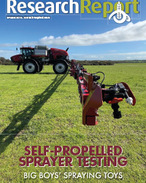This article is 8 years old. Images might not display.
That is according to Rabobank’s latest Rural Confidence Survey, which found that strong market fundamentals for most commodities underpinned a largely positive outlook for Australia farmers.
Rabobank national manager Country Banking Australia Todd Charteris said while the hot summer on the eastern seaboard had slightly diminished confidence, the nation’s farmers were poised for a good year, with farmgate prices expected to come in above their five-year average in 2017.
Sheep graziers were the most bullish about their prospects, while dairy farmers posted the largest turnaround in confidence as farmgate margins look set to improve throughout the year.
“Wool prices have also risen strongly in recent months, particularly at the finer-end of the market, which has seen some renewed confidence in the industry,” Charteris said.”
“Farmgate prices for southern export-orientated dairy farmers are expected to increase in 2017/18, while producers in the fresh milk market are anticipating prices to remain stable at relatively elevated levels.”
While cotton and sugar markets are expected to remain relatively well-supported by global fundamentals, Charteris said grains and oilseeds were proving to be the exception, particularly wheat.
“The wheat market continues to face strong headwinds, with the sheer abundance of wheat on the global market expected to mute potential price improvement this year,” he said.
While the eastern states sweltered over summer, wet conditions across much of WA’s agricultural region during February providing significant stored moisture for the state’s 2017 grains crop.
But Charteris said the stars had “really aligned for those in the livestock industry”, with sheep and cattle still fetching strong prices in the saleyards, while many entered summer with a good availability of feed and water.
Respondents also have concerns over how the Trump Administration may impact the global agriculture markets, and how that would flow back to Aussie farmers.
In the survey, 30 per cent of farmers reported concerns over the new Trump administration may have a negative impact on Australian agriculture, particularly on trade relations with the US.
“Although it is too early to assess the impact of the Trump presidency on Australia’s agri sector, it is clear the administration change in the US is providing some uncertainty in the near-term and potentially some turbulence in the medium-term on economic and regulatory fronts,” Charteris said.
From a business perspective, investment in on-farm infrastructure remained a key priority, while farmers were also looking to upgrade plant and machinery, increase their livestock numbers and invest in new technologies.























